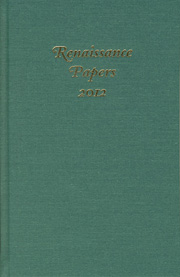Book contents
- Frontmatter
- Contents
- Dedication
- Reconstructing the Bower of Bliss: Homoerotic Myth-Making in The Faerie Queene
- Ovid, Lucretius, and the Grounded Goddess in Shakespeare's Venus and Adonis
- The Soul as Commodity: Materialism in Doctor Faustus
- Antipholus and the Exorcists: The Acts of the Apostles in Shakespeare's The Comedy of Errors
- Paul's Cross Churchyard and Shakespeare's Verona Youth
- The Summoning of Hamlet and Lear
- “Bred Now of Your Mud”: Land, Generation, and Maternity in Antony and Cleopatra
- Cosmetic Blackness: East Indies Trade, Gender, and The Devil's Law-Case
- From One Marvell to Another: Puritan Logic in “To His Coy Mistress”
- “An Heap Is Form'd into an Alphabet”: Thomas Blount's Sociable Lexicography
- Getting Past the Ellipsis: The Spirit and Urania in Paradise Lost
“Bred Now of Your Mud”: Land, Generation, and Maternity in Antony and Cleopatra
Published online by Cambridge University Press: 05 December 2013
- Frontmatter
- Contents
- Dedication
- Reconstructing the Bower of Bliss: Homoerotic Myth-Making in The Faerie Queene
- Ovid, Lucretius, and the Grounded Goddess in Shakespeare's Venus and Adonis
- The Soul as Commodity: Materialism in Doctor Faustus
- Antipholus and the Exorcists: The Acts of the Apostles in Shakespeare's The Comedy of Errors
- Paul's Cross Churchyard and Shakespeare's Verona Youth
- The Summoning of Hamlet and Lear
- “Bred Now of Your Mud”: Land, Generation, and Maternity in Antony and Cleopatra
- Cosmetic Blackness: East Indies Trade, Gender, and The Devil's Law-Case
- From One Marvell to Another: Puritan Logic in “To His Coy Mistress”
- “An Heap Is Form'd into an Alphabet”: Thomas Blount's Sociable Lexicography
- Getting Past the Ellipsis: The Spirit and Urania in Paradise Lost
Summary
Analyses of Antony and Cleopatra have long noted the dialectical opposition between Rome and Egypt, an opposition that sets up a concomitant correspondence between geography and gender. Although recent scholarship has destabilized the categories, Rome has traditionally represented the masculine—solid, controlled, bounded—while Egypt is feminine—fluid, unchecked, limitless, and thus constantly generating. Egypt in the play evokes an elemental fecundity that is spontaneous and natural at the same time that it is corrupting and degenerate, “dungy,” in Antony's words. Further, the connection between Cleopatra and Egypt is inextricable in the play; she exists in metonymic relation to her country, the word “Egypt” used no less than seven times to refer to her directly. Picking up on Janet Adelman's argument that the play constructs Cleopatra as “one with her feminized kingdom as though it were her body,” this essay examines the complex idea of Egyptian earthiness in connection with Cleopatra and her fertile/infertile body by reading it in conjunction with various theories of reproduction—what the Renaissance called generation. Specifically, I seek to show how the trope of spontaneous generation allows Shakespeare to expand his interrogation of procreation in the play, blurring gender boundaries as he does so.
- Type
- Chapter
- Information
- Renaissance Papers 2012 , pp. 67 - 82Publisher: Boydell & BrewerPrint publication year: 2013



